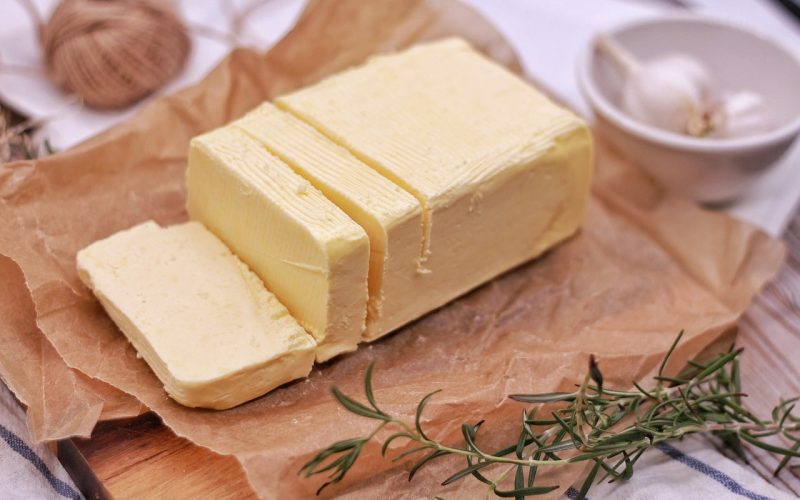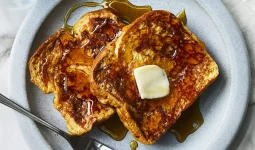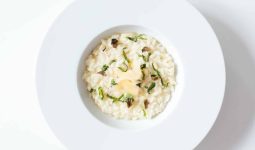There are various substitutes for butter for people who cannot or do not want to eat it. Butter is a dairy product made from churned milk or cream.
Also, Butter is a cooking fat formed from solid milk components, fat, and protein. Butter is most commonly created from cow’s milk, although You can also make it from any mammal’s milk (like goat, sheep, or buffalo).
Churning liquid milk until the solids separate is how it’s manufactured. The solids are filtered, drained, kneaded, and pressed into a firm block.
According to the FDA, anything sold as butter must contain at least 80% milkfat (the rest is mainly used in water with a little protein).
Its low smoke point means it will burn quickly in high-heat cooking methods. You can store it at room temperature, in the fridge, or frozen; it has roughly 100 calories per tablespoon.
However, this article will inform you about some of the best substitutes for butter used in baking, cooking, and spreading.
1. Olive Oil

Olive oil is used in a variety of Mediterranean cuisines. When sautéing vegetables and meat in any dish that calls for stovetop cooking, olive oil can easily be substituted for butter. Compared to butter, using a bit less olive oil is always advisable.
However, olive oil is not always a viable baking replacement. Many baked items call for the fat to solidify or revert to a solid state when they cool. However, some baked goods, such as pancakes, can be made with olive oil.
Monounsaturated fat is the predominant form of fat in olive oil, and it may provide health benefits that saturated fat in butter does not.
A study by Trusted Source found that ingesting olive oil regularly can lower the risk of cardiovascular disease and mortality in people with high cardiovascular risk.
Monounsaturated fat also lowers cholesterol and improves blood sugar regulation, among other things. Olive oil, like butter, is a calorie-dense meal. As a result, it should be consumed in moderation.
2. Ghee
Ghee is a type of clarified butter with a nutty flavor and scent. In cooking and baking, ghee can be used instead of butter in a 1-to-1 ratio, just as we use coconut oil.
However, because ghee includes more moisture than butter, some recipes may require adjusting the amount of ghee.
Also, ghee is best used as a butter alternative for baked items that demand higher temperatures in cooking. This is one of the best substitutes for butter.
3. Greek Yoghurt
Greek yogurt is a high-protein butter alternative that You may use in various baking recipes. It could give the dish a tangy flavor.
If you want to keep baked products moist, search for full-fat yogurt. Nonfat yogurt may result in a finished product that is drier and crumblier.
4. Coconut Oil
Coconut oil can be used instead of butter in baking at a 1:1 ratio, though the flavor may differ significantly depending on the coconut oil used.
Unrefined coconut oil has a more robust coconut flavor than refined coconut oil. It’s perfect for recipes that call for tropical or decadent chocolate flavors.
Furthermore, you can use a more refined kind of coconut oil or a different substitute if you don’t like the flavor of coconut. Coconut oil is one of the best substitutes for butter.
Coconut oil is a good butter substitute since it returns to a solid state at room temperature, unlike olive oil, which may not suit all baked items.
However, coconut oil has a distinct flavor that may affect the flavor of many baked items. However, the more refined the coconut oil is, the less coconut-like it tastes.
While coconut oil is a suitable alternative for individuals who want to avoid dairy, it may not provide many additional health benefits.
A review of multiple studies published in 2016 found no evidence of health advantages from coconut oil.
Also, the experts advise those who want to lose weight to avoid foods that contain coconut oil as the main ingredient.
5. Mashed Banana
Bananas, like pumpkin purée, add nutrients and boost the food’s nutritional content without adding fat. On the other hand, bananas can provide sweetness and a particular flavor to various dishes.
6. Applesauce
In baking, applesauce is a common alternative to butter and oil. Like many other alternatives, it can reduce calories while increasing the nutritional value of various recipes.
Because applesauce contributes natural sweetness to a recipe, it can be used as a butter alternative with fewer added sugars.
7. Nut Butter
Nut kinds of butter come in various flavors, including those made from almonds or peanuts. Also, Nut kinds of butter, like avocados, contribute healthy fat and nutrients to recipes.
Also, Nut butter can change the flavor of baked goods by increasing their density. Butter replacements can often boost the nutritional value of the foods in which they are used. They may be able to lower calories while adding healthy fats in some circumstances.
Butter substitution is not always practicable, as the quantity of the substitute may need to be adjusted to achieve the desired texture and density while baking.
People who want to make healthier choices when cooking, baking, and spreading may wish to consider some of these substitutes for butter.








